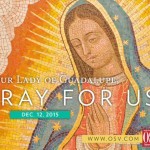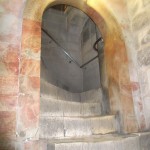1.
St John of the Cross, reveals the spiritual life to be darkness and light, suffering and joy, sacrifice and love. pic.twitter.com/h3IaDDxjzf
— Fr. Patrick Brennan (@Pathound) December 14, 2015
2.
Statue in the Carmelite chapel @MarysShrine of Saint John of the Cross whose memorial is today
https://t.co/E1qrxHn2R0
— Fr Lawrence Lew OP (@LawrenceOP) December 14, 2015
3. Pope Benedict said, about John of the Cross’s example:
If a person bears great love in himself, this love gives him wings, as it were, and he can face all life’s troubles more easily because he carries in himself this great light; this is faith: being loved by God and letting oneself be loved by God in Jesus Christ. Letting oneself be loved in this way is the light that helps us to bear our daily burden.
And holiness is not a very difficult action of ours but means exactly this “openness”: opening the windows of our soul to let in God’s light, without forgetting God because it is precisely in opening oneself to his light that one finds strength, one finds the joy of the redeemed.
4.
There exists a close relationship between the doctrine of St. Thomas Aquinas and that of St. John of the Cross. pic.twitter.com/PvnXR3qeOJ
— Amigo de Frodo (@bpdflores) December 14, 2015
5.
"The cross must be borne by everyone who wishes to be saved, in accord with the good pleasure of God the grace He gives them" St John of God
— Fr Brad Sweet (@BradBradsweet) December 15, 2015
6. His advice on surrendering self-love.
7. Why T.S. Eliot Loved St. John of the Cross
8.
One of my favorite quotes – "Where there is no love, put love — and you will find love." – St. John of the Cross
— Bishop David Ricken (@BpDavidRicken) December 14, 2015
9. In the Office of Readings for his feast day, from a spiritual canticle by Saint John of the Cross:
Though holy doctors have uncovered many mysteries and wonders, and devout souls have understood them in this earthly condition of ours, yet the greater part still remains to be unfolded by them, and even to be understood by them.
We must then dig deeply in Christ. He is like a rich mine with many pockets containing treasures: however deep we dig we will never find their end or their limit. Indeed, in every pocket new seams of fresh riches are discovered on all sides.
For this reason the apostle Paul said of Christ: In him are hidden all the treasures of the wisdom and knowledge of God. The soul cannot enter into these treasures, nor attain them, unless it first crosses into and enters the thicket of suffering, enduring interior and exterior labors, and unless it first receives from God very many blessings in the intellect and in the senses, and has undergone long spiritual training.
All these are lesser things, disposing the soul for the lofty sanctuary of the knowledge of the mysteries of Christ: this is the highest wisdom attainable in this life.
Would that men might come at last to see that it is quite impossible to reach the thicket of the riches and wisdom of God except by first entering the thicket of much suffering, in such a way that the soul finds there its consolation and desire. The soul that longs for divine wisdom chooses first, and in truth, to enter the thicket of the cross.
Saint Paul therefore urges the Ephesians not to grow weary in the midst of tribulations, but to be rooted and grounded in love, so that they may know with all the saints the breadth, the length, the height and the depth—to know what is beyond knowledge, the love of Christ, so as to be filled with all the fullness of God. The gate that gives entry into these riches of his wisdom is the cross; because it is a narrow gate, while many seek the joys that can be gained through it, it is given to few to desire to pass through it.
10.
As Advent deepens further still, St John of the Cross steps forward as our guide. Sometime today, "remain alone in loving awareness of God."
— Msgr B Bransfield (@BrianBransfield) December 14, 2015
• His father died when he was two and he, his mom and two brothers grew up in poverty. Eventually he began working in a hospital while taking simple classes and the hospital administrator paid for his education. He eventually became a Carmelite, the worldliness and in some places sinfulness of the Carmelites led him to think that he might be called to be a Carthusian. That’s when he met with St. Teresa of Avila, the foundress of the Discalced Carmelites, who asked him to work with her to reform the whole order. He did. And he suffered for it. Many of the Carmelites did not want to be reformed and they weren’t open to the fact that this reform was coming from God. On one occasion, the unreformed Carmelites essentially imprisoned him from months in a dirty, dank cell with just a sliver of light coming in. On the second occasion, they brutalized him as he prepared for death. But the religious name he had taken in the reformed Carmelite, St. John of the Cross, was well chosen: and it was through bearing that Cross that he discovered God’s power and wisdom, writing some of his greatest spiritual works — his four great poems on the interior life that led to his four great commentaries — during those sufferings. What we see in his case is that, even though he was inspired by the Holy Spirit more than any saint who has ever lived to give the road map of the interior life — something that has formed many to become saints — there were others, religious in fact, who opposed him, because he wasn’t doing any of this with their authority, approval or permission. They, like the chief priests and the elders, were oblivious to the fact that he was coming from God and working with his authority.
• This is always a danger for us. We see it still in the Church. There are many today who are basically challenging whether Pope Francis is working for God. It’s of course possible for someone to think that a particular initiative, or appointment, or statement might be imprudent, but that’s different from the type of general questioning that some are engaging in, as if God couldn’t possibly be acting in him if he’s doing anything other than they would want. I’ve met some priests in the last week who told me that they weren’t planning to do anything for the Year of Mercy because they think that it’s really just a year of indulgence, a year to give divorced-and-civilly-remarried people sacrilegious communions, etc., as if this is an initiative that wouldn’t be coming from God. We see it in the way some respond, for example, to St. John of the Cross and to the other doctors in the Church. If we accept them as sent by God as the cartographers of the soul, why don’t we learn from them more, as through them God tries to show us his ways? And we’re all prone to looking at things from worldly lenses whenever, for example, someone even in religious life or in our dioceses asks us to do something contrary to our expectations or preferences. For many of us, our first reaction is to look at it as a personality conflict, or a blind spot on the one in authority, rather than looking at it first with the perspective of faith. In Advent, as we get ready to receive Jesus in history, mystery and majesty, we recall that in Bethlehem many refused to accept Jesus; when he comes in the Eucharist, many of the disciples turned away; and when Christ comes again, including under the distressing disguise of the poor and needy today, many people refuse to act on his words that mercifully teach us his ways.
• As we learn from Balaam’s prophetic utterance despite his bad beginning, and the chief priests’ and elders’ refusal to accept John the Baptist’s and Jesus’ words and actions despite their good beginning having been nourished by God’s word and the worship of him in the temple, it doesn’t matter so much where we start but how we end up. This goes for us this Advent and it also goes for everyone else. We prepare to celebrate Christ’s birth in a stranger’s animal cave rather than a place and being placed in a beast’s trough rather than in a crib. That would have seemed in the eyes of the world and even in many religious Jews’ eyes as if the child were cursed from the start, but we know that even from those humble grounds, God turned that affliction into a blessing. In the most powerful way of all, when Jesus was pinned to a tree underneath a signed mockingly proclaiming him that king of the Jews, God did something even greater. The Jews and Romans both used to say, “Cursed be anyone who dies on a tree,” and many of the same chief priests and elders were cursing Jesus as they saw him dying on Good Friday. But God made that malediction the greatest blessing in human history — in fact the blessing with which we began our prayer of the Mass and the blessing with which we will finish our Mass, namely the Sign of the Cross. God always draws good out of evil, he always seeks to turn curses into caress, blights into blessings. We ask him to convert in us whatever is resistant to receiving his prophetic words and sharing them and to transform us into the disciples, prophets and divine blessing — like St. John of the Cross before us — the world so much needs this Advent and beyond!
12.
"In the evening of life, we will be judged on love alone." St. John of the Cross #saints #quotes
— Teresa Tomeo (@TeresaTomeo) December 11, 2015












